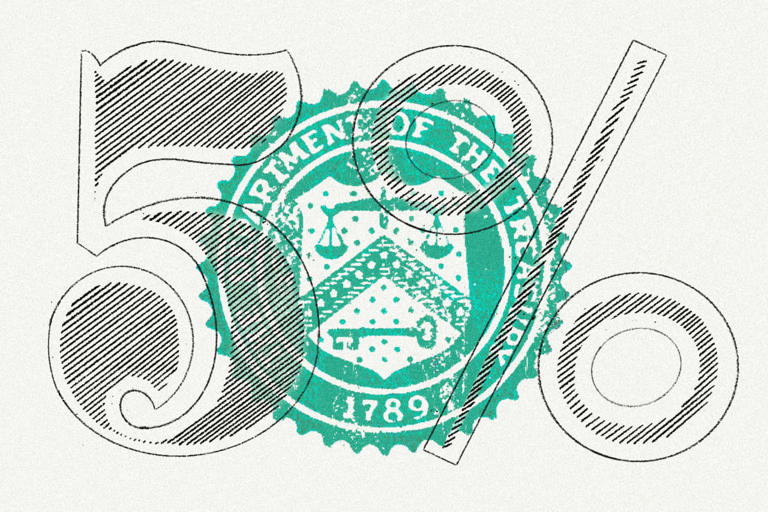Investors, both large institutions and individual retail investors alike, are increasingly turning to Treasury bills (T-bills) as an attractive investment option. Thanks to their yields of 5.4%, tax advantages, and reputation for security, T-bills are becoming a favored choice in today’s financial landscape.
The allure of T-bills lies in their favorable yield relative to other U.S. debt offerings. In a phenomenon known as the inverted yield curve, short-term rates have surpassed long-term ones, making T-bills particularly appealing. For example, while the 10-year Treasury yields 4.45%, the three-month T-bill offers a significantly higher yield of 5.39%. Moreover, T-bills have delivered positive returns this year, approximately 2% based on popular exchange-traded funds, in contrast to long-term Treasuries, which have incurred losses.
Notably, prominent figures in the financial world, including Berkshire Hathaway CEO Warren Buffett, have endorsed short-term Treasuries as a prudent investment choice. Berkshire Hathaway holds a substantial position in T-bills, emphasizing their safety and reliability, qualities that align with Buffett’s risk-averse investment philosophy.
Retail demand for T-bills has surged, with strong participation in the Treasury’s regular auctions. Individual investors have flocked to T-bills, drawn by their attractive yields and tax advantages. Unlike interest from bank accounts and money-market funds, interest earned on T-bills is exempt from state and local taxes, making them particularly appealing to investors in high-tax jurisdictions.
In addition to their favorable yields and tax benefits, T-bills offer simplicity and accessibility to investors. Retail investors can easily purchase T-bills through online platforms or financial institutions, often without incurring fees. Furthermore, ETFs focused on T-bills provide investors with a convenient and low-cost means of gaining exposure to this asset class.
While T-bills carry reinvestment risk, whereby future yields may be lower than current ones, their current high rates make them an attractive option for income-seeking investors. Even if short rates were to decline, they are expected to remain in the 3% to 4% range, offering a steady and risk-free source of income for the foreseeable future.
Overall, the growing popularity of Treasury bills reflects investors’ quest for safety, yield, and tax efficiency in today’s uncertain economic environment. With their combination of attractive returns and minimal risk, T-bills are poised to remain a favored investment option for both institutional and individual investors alike.
Moreover, the broad appeal of T-bills extends beyond their financial characteristics. Their status as a bedrock of the U.S. financial system, backed by the full faith and credit of the government, provides investors with unparalleled confidence in their safety. This assurance is particularly valuable during times of economic uncertainty or market volatility, as investors seek refuge in assets perceived as low-risk and stable.
Berkshire Hathaway’s substantial investment in T-bills underscores their reputation as the “safest investment there is,” according to Warren Buffett. The company’s sizable holdings of T-bills, amounting to $153 billion at the end of the first quarter, reflect Buffett’s longstanding preference for preserving capital and minimizing risk in Berkshire’s investment portfolio.
Individual investors have also taken note of the appeal of T-bills, with retail demand surging at Treasury auctions. This increased interest from retail investors is evident in the robust participation in noncompetitive bids, which serve as a proxy for individual demand. The significant uptick in retail participation, with noncompetitive bids averaging $15 billion per month over the past year, underscores the growing recognition of T-bills as an attractive investment option for individuals seeking safety and income.
Moreover, T-bills offer distinct advantages over alternative cash investment options, such as certificates of deposit (CDs), money-market funds, and high-yield savings accounts. While these alternatives may offer competitive yields, T-bills stand out for their superior tax efficiency and exemption from state and local taxes on interest income. This tax advantage makes T-bills particularly appealing to investors in high-tax jurisdictions, enhancing their overall attractiveness as an investment vehicle.
Furthermore, the accessibility and liquidity of T-bills make them a convenient option for investors of all sizes. Retail investors can easily purchase T-bills through online platforms or financial institutions, often without incurring fees. Additionally, ETFs focused on T-bills provide investors with a cost-effective and efficient means of gaining exposure to this asset class, offering liquidity and diversification benefits.
In conclusion, Treasury bills offer a compelling combination of safety, yield, and tax efficiency, making them an attractive investment option for investors seeking stability and income in today’s uncertain economic environment. As demand for T-bills continues to grow among both institutional and individual investors, they are poised to remain a cornerstone of investment portfolios for years to come.
